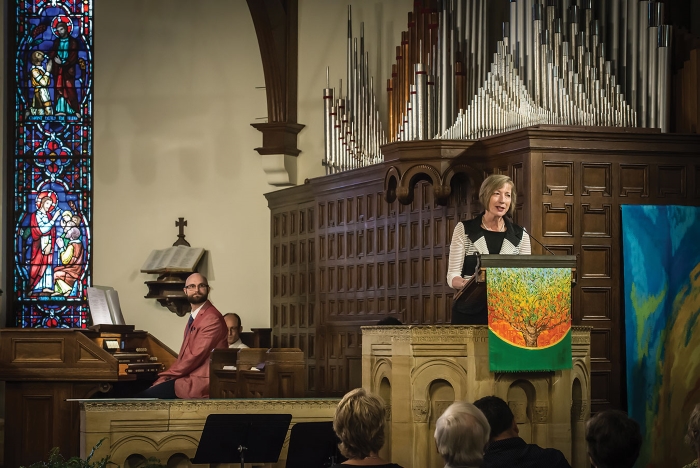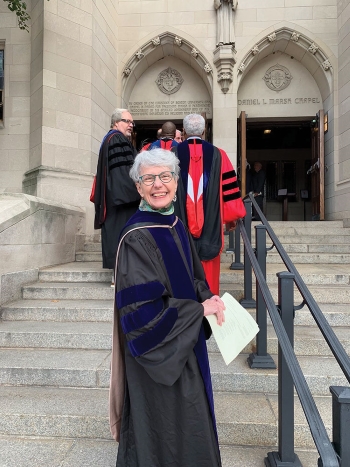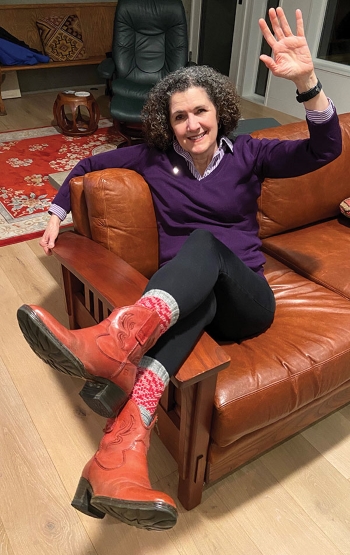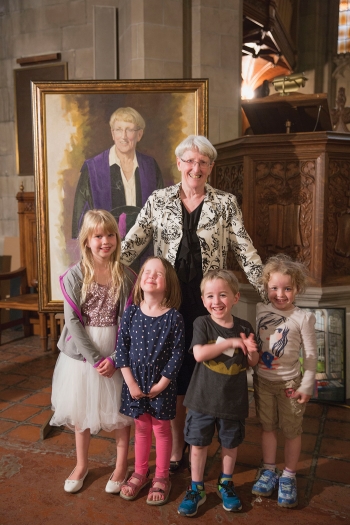Data from the Association of Theological Schools (ATS) reveals that in 1971, women represented 10 percent of students, 3 percent of faculty, and 12 percent of full-time administrators at seminaries in the United States and Canada. Today, those numbers are far different — 35 percent of students, 25 percent of faculty, and 39 percent of full-time administrators are women.
And as the number of women in positions of leadership at theological schools has increased, so too, of course, has the number of women leaders retiring or stepping down from those positions. In the past year, several presidents and deans announced they would be leaving. Interested in what these presiding officers learned while in their positions of leadership, we reached out to four of them, asking in particular how gender issues affected their roles, both earlier in their careers and more recently. (All of these departures were planned long before the COVID-19 pandemic in 2020.)
Each of these four chief executives was the first woman to hold the top leadership post at her school. Each says she’s seen progress for women in the field of theological education, though the progress has of course been uneven. In Catholic and evangelical Protestant seminaries, fewer women occupy top positions of leadership (sometimes because seminary executives are often ordained clergy) and the Catholic church does not ordain women, nor do some evangelical Protestant denominations.
The women interviewed for this article agreed on several things. All say the ATS Women in Leadership project has been instrumental in their careers. Most of them report they had few female mentors themselves, and that they have been intentional about serving as mentors to the new generation of women leaders. And all express the need for more leadership roles to be open to people of color. Having benefitted from seminaries’ progress on the issue of gender, they now want to expand the circle for others who may have been excluded from positions of leadership.
A cloud of witnesses made it possible
The Rev. Dr. Carol E. Lytch
Lancaster Theological Seminary, President, 2011–2020
Carol Lytch, a Presbyterian minister, says that being elected as a church elder while she was still a teenager initiated her into church leadership. Nevertheless, she still considers herself something of a reluctant leader. “Little girls don’t say they want to be a theologian or seminary president when they grow up,” she laughs. “But then you look back and realize that with all the leadership opportunities you’ve had, you’re equipped to do this job that you never set out to do.”
When Lytch became president of Lancaster Theological Seminary in 2011, she was the first woman in the seminary’s top leadership spot — a fact that sometimes surprises those who know about the egalitarian spirit of the United Church of Christ (UCC), the denomination with which the seminary is affiliated. (Lytch has ordained standing in both the Presbyterian Church [USA] and the UCC.)
| |
|

|
|
Carol E. Lytch at the pulpit of the historic Santee Chapel at Lancaster Theological Seminary.
|
After Lytch’s nine-year presidency, women now make up a majority of students at Lancaster, and the leadership team, which includes three vice presidents, is all female. But female board chairs and deans at the seminary had paved the way, as had a previous generation of women administrators in theological education to whom Lytch feels indebted. “They were the trailblazers,” she says. “I look to them as the ‘cloud of witnesses’ who made it possible for me to be a president.”
Her latest priority is bringing more people of color into leadership. “I feel like women’s leadership is pretty secure, but what I care about now is multicultural diversity in all sectors of the seminary — student body, trustees, staff and professors.”
But she also admits there is “still a way to go” for all top seminary positions to be equally accessible to women. “It’s very uneven across North Americans seminaries” says Lytch, who was assistant executive director of ATS at the time she was named president of Lancaster.
Lytch speaks fondly of a group of six women seminary presidents and senior administrators who have met regularly for more than 10 years, noting that they demonstrate varied leadership styles, some more outspoken, others “gentler” but still powerful. “I’m definitely a collaborative leader,” she adds. “I’m not a solo star, but someone who works with people to advance the mission together.”
After her June 2020 retirement, Lytch plans to shift her leadership skills from the seminary to the community, although she has already volunteered to lead an accreditation visit to another seminary this fall.
She believes the next generation of seminary leaders must be willing to continually learn new skills — essential skills like strategic leadership and fundraising — to serve their institutions and move them forward. “Leading a seminary requires a person who really loves and is fascinated by institutions — and someone who would rather work corporately than individually — and someone who loves the church and wants to do something big.”
But, as Lytch has realized, leadership also is a divine calling. “It certainly has to be sustained by God. To flourish in that role, you have to have a prayer life and practices that support you.” That is wisdom she can continue to rely on, long into the next phase of life, whatever that may be. Lytch and her husband, the Rev. Stephens Lytch, who was profiled in the Spring 2020 issue of In Trust, plan to stay in Lancaster and use their gifts for the betterment of their adopted city, which they’ve come to love over the last decade.
Trust your own dignity
Dr. Mary Elizabeth Moore
Boston University School of Theology, Dean, 2009–2020
After four decades in theological education, Mary Elizabeth Moore, dean of Boston University School of Theology and an ordained deacon in the United Methodist Church, is now able to take the long view. From that perspective, she sees that a good deal of progress has been made — institutions have become more amenable to women in roles of leadership — and she is also more confident in her ability to identify gender bias.
“One of the biggest challenges is to discern what is really gender bias and what is something else,” says Moore, who became the first female dean of the Boston University School of Theology in January 2009. Age and experience have taught her to sort through the issue “in a more nuanced way,” she says.
“I was not treated the same way as the male staff,” Moore says about her time working as a young adult in the church. “I knew there were certain limits beyond which I could not go.”
 |
|
Mary Elizabeth Moore entering Marsh Chapel in 2019 for the final matriculation over which she presided as dean of Boston University School of Theology.
CREDIT: BOSTON UNIVERSITY SCHOOL OF THEOLOGY
|
But today, the sheer number of women faculty members and administrators in higher education proves that the terrain has changed. Gender bias still exists, but sometimes it is subtler. “Many schools still bend toward men and are happy to have women who are good background figures.”
Like many in her generation, Moore had few female mentors when she was a young scholar, so she has tried to be a mentor to younger women throughout her career. As dean, she has increased the number of women in leadership roles at her school. The administrative council, for example, has three times as many women on it as when she started as dean.
“One of my roles was to create space and open pathways for women and people of color,” she says. “I tried to rethink positions as they opened in order to imagine new directions that would stretch our school and our ability to deepen and broaden our education and outreach. Together, the faculty and staff sought to open ourselves to the gifts and contributions of diverse leaders, including women and people of color.”
She praises her current colleagues for the support they have given her but admits that her background and socialization as a woman have resulted in a lack of self-confidence — a feeling she suspects many men don’t have. “I have worked hard to give my best, not to prove myself to others, but to ensure the best for the school. I think I have pressured myself more than most of my male colleagues,” she says. “When things go wrong, I immediately blame myself. I worry that I will fail to give what the school most needs. I have learned to accept and live with this self-doubting flaw in myself.”
Her advice to women in the next generation of leadership: “Trust your own dignity as a human being.”
She also encourages women to develop spiritual practices to help them remain centered. Moore begins and ends each day with prayer, and uses simple breath prayers throughout the day and during stressful situations.
Now, Moore plans to take a one-year sabbatical to work on two writing projects and to spend a lot more time with her children and grandchildren.
Moore says she knows that today schools and search firms work much harder to find candidates from under-represented demographic groups than they used to. She’s not sure if her replacement will be a woman, “but I do know I’ll be replaced with someone who is open-minded and sensitive to cultural and gender issues,” she says.
Self-awareness is the key
Dr. Lallene J. Rector
Garrett-Evangelical Theological Seminary, President, 2014–2020
Vice President of Academic Affairs and Academic Dean, 2006–2013
Women have been a major part of Garrett-Evangelical Theological Seminary since the 1930s, when the Chicago Training School, co-founded by Lucy Rider Meyer in 1885, merged with what was then called Garrett Biblical Institute. Later that decade, Georgia Harkness, the first female full professor at a Protestant seminary in the United States, joined the faculty at Garrett.
But it wasn’t until 2013 that the United Methodist seminary in Evanston, Illinois, appointed Lallene J. Rector as its first female president. She is also the school’s first nonordained president, which she sees as a plus, given the large number of lay students who now make up the student body both at Garrett-Evangelical and at many other theological schools.
 |
|
Social distancing at home, Lallene Rector issued an informal but emphatic “thank you” to donors who pushed the school past its fundraising goal during this spring’s Georgia Harkness Giving Day.
CREDIT: MARK GEHRIE
|
Rector reports that at no time — not when she was a teacher, a dean, or a president — was her lay status or her gender a stumbling block. Yet she knows her experience is not universal among her “sisters in leadership.”
“Being female has been celebrated at this school,” Rector says, noting that about half the student body and 40 percent of the faculty are women. “To be perfectly honest, I grew up at Garrett-Evangelical, so I’m well steeped in feminist, womanist, mujerista, and Asian women’s perspectives.”
When she was a young faculty member, Rector was mentored by senior female professors during monthly gatherings. These days, the female faculty gather at least once a year for a retreat. In addition, Rector has found support from a group of female colleagues who have been meeting twice a year for more than 15 years. She has now mentored a new generation of students and advisees. And as a longtime participant in events organized by the ATS Women in Leadership program, Rector has encouraged other women to get involved as well.
She praises the progress women have made in leadership roles in seminaries but says today’s “growing edge” is to help women of color succeed as leaders. In 2019, Rector appointed Rev. Dr. Mai-Anh Le Tran, the first woman of color to serve as Garrett-Evangelical’s vice president for academic affairs and academic dean:
Rector says that when it comes to serving in leadership roles, women face several challenges — especially in the field of theological education. Because of the challenges many seminaries are currently facing, a lot of search committees look leaders who can “hit the ground running” — and for several reasons, typically, the kinds of people who are perceived to be safe and tried-and-true are often men.
On the other hand, some schools, full of good intentions, hire female leaders, but their institutional culture is not prepared to equip (or sometimes even to accept) women in leadership. “If the environment fails to be supportive, it can be very difficult to flourish and grow,” Rector warns.
She adds that self-awareness is the key to success in leadership — for women and men. “There are all kinds of skill sets and knowledge, but I think attending to one’s being is the most important,” she says. “Why we’re in leadership, what it means for us, what our personality and style are — answering those questions becomes the vehicle through which leadership happens.”
Rector is not retiring but is rather returning to faculty status because she is committed to caring for loved ones who have serious health challenges. She says she sometimes struggles to maintain a work-life balance. “I love my work. It gives me great joy. But it’s not something that I can bracket out very much. It’s in my head all the time. So I have to pull myself out a bit, or I would do it 24 hours a day.”
As she moves through this next transition, Rector will rely on her faith. “It orients me and grounds me. “The more disciplined I am in my spiritual practice, the better I’m functioning on the ground.”
A wisdom I needed to honor
The Rev. Dr. J. Dorcas Gordon
Toronto School of Theology, Interim Director, 2018–2019
Knox College, Principal, 1999–2017
Before her installation as principal of Knox College, Dorcas Gordon tried on the academic gown that had been passed down to her from previous principals. Her staff burst into giggles; it was made for her predecessor’s predecessor, a man of significant size, well over 6 foot tall.
Gordon, who in 1999 became the first female principal of Knox, the largest theological college affiliated with the Presbyterian Church in Canada.
Her appointment as principal was contested, and throughout her 18-year tenure, Gordon, a biblical scholar, found herself using a “hermeneutic of suspicion” to analyze how she was being perceived by her colleagues. “This is what women have to do all the time,” she says, referring to a question women in leadership roles have to regularly ask themselves: “Is it my gender? Is it me?”
Gordon says she felt an “undercurrent” of sexism. For example, while male leaders would receive praise for consensus-based decision making, a woman using this kind of approach was often seen as “not knowing her own mind.”
“I had to be very astute in how I was reading things, because one can overreact or under-react,” she says.
 |
|
Surrounded by four of her eight grandchildren, J. Dorcas Gordon was honored at her 2017 retirement from Knox College.
CREDIT: J. DORCAS GORDON
|
This kind of a “systems approach” is also necessary when evaluating the state of women’s leadership in seminary education today, adds Gordon, who retired at the end of 2019 after a year and a half as interim director of the Toronto School of Theology, the consortium of which Knox is a member.
“I don’t think the onus can be put on women: ‘If only women would step up to leadership,’” she says. “Women need more fortitude than male colleagues to make it. We have to ask, ‘How does the system change to allow for equal leadership from women and men?’”
Although she says there has been more openness to women in roles of leadership, obstacles still remain — and even more so for women of color. “There is still something in the system that causes women to have to work a little harder,” she said. “My biggest disappointment is that these obstacles still demand significant energy.”
Gordon, who served as president of ATS from 2012 to 2014, wonders how many women aspiring to leadership roles have been lost along the way. She recalls some of the women she has met through various ATS Women in Leadership events who did not move into seminary leadership roles. “Where are they?” she asks.
In her retirement, Gordon will continue to work with doctoral students and serve on various church committees and boards, including one as president of the International Association of Women Ministers. And she’ll continue to encourage people to think about “decolonizing” theological education, which she believes is still overly beholden to continental European modes of training and scholarship developed in the 18th century. “Is this proper training for those who are going to be leaders?” she wonders. “We have to think deeply and reflectively about what it means to be in seminary leadership and how we, as individuals and collectively as women, fit or don’t fit into it.”
Despite not having had a single female professor when she was in seminary, Gordon says she needed to develop a robust sense of self to remain in leadership over the long haul. “One of the things I discovered was that 50 years of experience in both church and seminary had given me a wisdom that I needed to honor.”